Creative Corner: The Scroll
by Denise Durocher
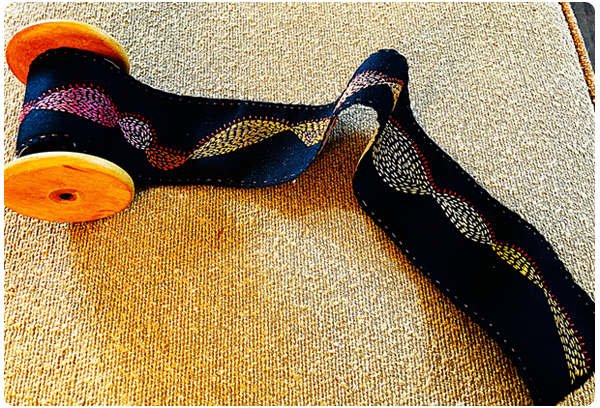
The Scroll by Denise Durocher - Old bobbin, black fabric, white backing, embroidery floss.
I started this fabric scroll which is four inches wide and about 2 meters long. My only parameters are using gradients of embroidery floss colours and a wave design. It is a slow process since I’m making so many stitches, and it kind of feels like a useless project. But I read something the other day: "This is worth doing for no other reason than that it is nice to do. So do it." (Can’t find the author, sorry).
It's a bit like my Focusing Sessions since for both, I don't know exactly how they will end. What will be revealed to me? Focusing has a method, I also gave this piece some structure: colours, waves. But will I like it once I'm done? I don't know. But as I stitch, something is revealed to me in the simple fact that I’m showing up to do it. As sometimes we don’t know why we decide to participate in a Focusing Session on a particular day. We just show up and most often than not, are amazed by what is revealed to us during that time.
Maybe some of you who read this will notice that in your own life, you are also working on something that hasn't fully revealed itself yet. I think that the fact that you are showing up, investing the time, the effort and the love, is in itself a revelation worth considering.
Video of what the scroll looks like so far!
Tribute to Father Peter Campbell 1935 - 2025
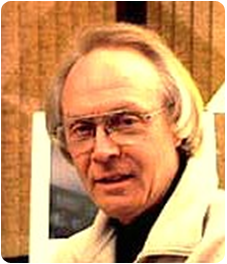
Fr. Peter Campbell
On July 5, 2025, the Focusing community lost one of its brightest lights with the passing of Father Peter Campbell. For more than fifty years, Father Peter devoted his life to teaching and living Focusing from a deeply Biospiritual perspective. His vision and dedication were instrumental in spreading Focusing worldwide, particularly throughout the 1980s and 1990s, as he and Father Edwin McMahon led countless domestic and international BioSpiritual education programs. Their efforts profoundly shaped the understanding of Focusing, highlighting its transformative potential for individuals and communities alike.
Father Peter was not only an educator but also a prolific author. Along with Father Edwin McMahon he co-authored many articles and books—BioSpirituality: Focusing As a Way to Grow, Beyond The Myth of Dominance: An Alternative to a Violent Society, and Rediscovering the Lost Body Connection in Christian Spirituality—that continue to inspire, heal, and guide readers across the world. The Nada Lou collection of his BioSpiritual videos further showcases his depth of insight, authenticity, and willingness to share his own vulnerabilities for the benefit of others.
Even in later years, when travel became impossible, Father Peter embraced technology, using a website (biospiritual.org), Skype and Zoom to continue sharing his wisdom. His commitment also led to the co-founding of the BioSpiritual Institute, ensuring that the BioSpiritual legacy would endure and flourish for years to come.
Above all, Father Peter embodied what he taught. Those fortunate enough to meet him in person experienced his genuine compassion and kindness. His ministry was dedicated to making “mysticism for the millions” a reality, empowering countless individuals to connect with their Inner Divine Wisdom and experience what Gene Gendlin called the “grace” of the felt shift.
The Focusing community will continue to benefit from the inspirational light of his presence, now lived out in all those who caught the fire from him and continue to practice and share Focusing. His light will also guide and uplift us, reminding us of the profound impact that one life, lived with faith, purpose and love, can have on the world.
Thanks to Joe Colletti for sharing this with us
Focusing and the Enneagram
by Therese Ryan
The Enneagram is a powerful psychological and spiritual system which helps us recognise our ingrained patterns of thinking, feeling and behaving. Decades ago, when the Enneagram began to be widely taught, type patterns were something to be gotten rid of. Now, in the Enneagram world, it’s all about understanding, appreciating and befriending our type patterns. And this is where I get very excited about how the Enneagram and Focusing compliment each other and invite us into a deeper relationship with ourselves.
Discovering my Enneagram type was the beginning of an ongoing exploration of the mainly unconscious survival strategies that helped form my personality. I lead with type six patterns. There are certain themes that resonate for everyone who lives with these patterns – doubt and anxiety among many others. And yet my lived experience of my “sixness” is unique to me, to my inner world.
Sometimes it seems that there’s nothing new for me to know about doubt. Focusers, however, understand that what our body has to say about who we are and how we are is often a surprise. When I take this word, doubt, freshly inside, Focusing makes it possible for me to peer into doubt’s dusty corners, to teeter at its edge and to discover something in me that’s strong and assured, an inner platform of support. In this way, the felt sense of a familiar theme is a doorway to who I am beyond my patterns.
We encounter our Enneagram patterns in all areas of our lives and of course they show up too when we Focus, perhaps in our anxiety about doing it “right”, or the gush of overwhelming emotions, or the difficulty in sensing into the body at all, or the push to get somewhere. Understanding my Enneagram patterns has helped me recognise and understand what gets in the way of me being present, not just when I Focus but in life.
The Enneagram unflinchingly points out our blind spots too. My suspicion for example, has been difficult to honestly acknowledge and yet Focusing enables me to attend kindly to whatever I discover within myself. My patterns often feel fixed and limiting, a block to my living process and yet through Focusing I’ve come to trust that that they too hold an implicit intricacy which offers freedom.
Both the Enneagram and Focusing see each person as a living process, always changing, longing to live life forward. Focusing with the Enneagram has enhanced my experience of both. Together they offer a way to navigate life. The Enneagram is a map showing us where we are, how we get stuck and pointing us in the direction of growth. Focusing is the compass that helps us find our way.
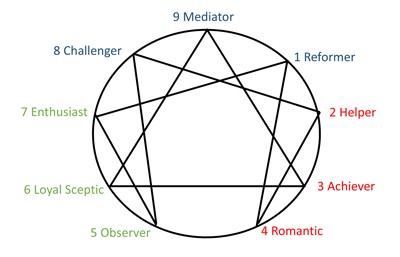
Process Skipping Online Workshop Reflection
By John Keane
In April and May this year, I offered an online workshop on the subject of Process Skipping. The group (40 people) met each week for 4 weeks for 2 ½ hours each week.
In my years of teaching BioSpirituality, I have come to appreciate the importance of this process to healthy human development. And, I have come to the sense that it is a process that needs time, space and gentleness to fully engage with it.
This program examined Process Skipping, a process identified by Eugene Gendlin and further developed by Frs. Peter Campbell and Edwin McMahon. Process Skipping is characterised by an unconscious avoidance of uncomfortable feelings or emotions. As such it can be a barrier to being lovingly present to what may need our attention. By understanding and addressing Process Skipping behaviours, individuals can find freedom from control and domination, engaging more authentically with reality.
Program Structure:
- Personal Exploration: Participants are invited to identify their own Process Skipping behaviours.
- Cultural Context: Examination of how cultural structures influence Process Skipping.
- Alternative Perspectives: Investigating love and its embodiment as alternatives to control and dominance.
The essence of this process is that it is now a maladaptive stress response. Its initial purpose was to prevent or minimize some perceived conscious or unconscious pain. This process becomes habitual over time.
Process Skipping can operate on a number of levels which we explored during the program.
- Mental or Rational Process Skipping
- Activity or behaviour Process Skipping
- Emotional Process Skipping
- Physical Process Skipping
At the beginning some of the participants expressed their reluctance about exploring this well defended aspect of our living. I acknowledge that it requires courage to engage with this program. BioSpirituality is not about doing therapy (although many therapeutic benefits can be gifted to us in this process). So, it is important to stress to participants, that if they discover process skipping mechanisms that may be harmful to themselves or others – they should seek the appropriate therapeutic help and guidance.
As the workshops progressed the support of the group was important as participants became aware of their process skipping patterns. There was the realisation that we all do this – and many shared that it also gave them an understanding and an empathy for friends and family that have their own expressions of process skipping.
There was a sense of wonderment in the group about how clever we were to protect ourselves initially when we encountered danger or stress. But also, a sense of relief, that we don’t need to do that anymore. Those parts of ourselves that were lost can become our greatest teachers and treasures.
It was also clear that the group developed a sensitivity and appreciation about the relationship between process skipping and addiction. Pete and Ed always stressed that some element of process skipping is evident in most cases of addiction. We are no longer powerless about this when we become aware of this process that is initially unconscious.
It was also clear that this program did not provide enough time for people to explore as deeply as they desired. This was the first time I have offered this workshop, next time I will provide more time. Time for refection between sessions, and more sessions to engage with the intricacies it reveals.
In essence, awareness and exploration of process skipping in both personal and cultural terms is a call to live into and develop a sensitivity for love and gentleness. It is akin to a kind of conversion experience, when we discover that we no longer need to control and manipulate our feelings. Living into these feelings and experiences can set us free. We begin to live life as it is – and not how we might wish it were. There is freedom beyond control…
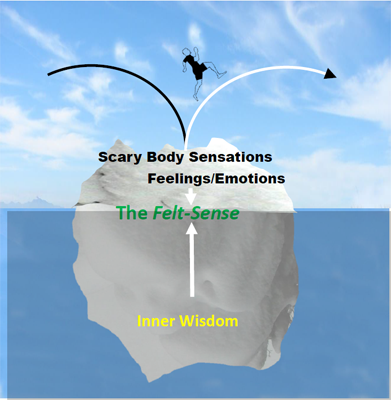
Children and Focusing Intro Day Experience
by Ann Harte Barry
Last June I attended my first IRL (in real life) focusing event since Covid. And what a wonderful re-entry it was!! I was really happy to meet old friends, to meet Zoom companions and to meet focusers I had not met before - and to feel that all 17 of us are all on the journey together.
The Children and Focusing Introduction Day, led by René Veugelers and Elaine Goggin, was held in the Dominican Retreat Centre, Tallaght – a very suitable venue in terms of welcome, comfort and accessibility.
The advertising blurb stressed that the training was not only for professionals working with children but ‘also supports and deepen your own process’.
That was so true! I personally found that while there was some stress on children all the exercises and teaching everything spoke directly to the various levels of child in me! It was immensely helpful. We were told that ‘you can’t move faster than your slowest process’. This is such a helpful starting point as often I am impatient, wanting ‘results’ and forgetting that other piece of wisdom shared: ‘the answer is already unfolding underneath’.
![]() The day was very helpful in helping me remain with the process and allowing what needed to emerge to emerge! The resources were creative and well designed and really helped my process. Of course the highlight was the use of emoji balls which ticked so many boxes!!
The day was very helpful in helping me remain with the process and allowing what needed to emerge to emerge! The resources were creative and well designed and really helped my process. Of course the highlight was the use of emoji balls which ticked so many boxes!!
During the course of the presentation I did become very clear how focusing can be a powerful positive energy in working and being formally and informally with children.
René’s powerful sharing on his work with a young person demonstrated the power of living focusing attitude, creative process suggestions and staying close to the felt sense, all done in a dynamic sensitive and fragile setting. We were blessed to receive this sharing and deep within I believe that in some mysterious way that we were compassionately present to the young person’s life and who knows how the power of that energy has rippled out from our group supporting his search for fulness of life.
The Invitation: to consider training for focusing with children. It was clear that the day was a ‘taster’. Certainly I am very convinced of the potential of focusing with children and can see that the training would be stimulating, deepening and enjoyable.
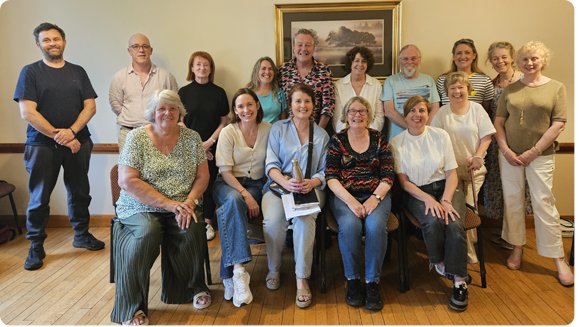
Group attending Children and Focusing Introduction Day in Dublin - 28th June 2025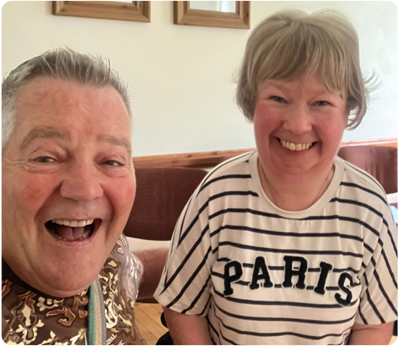
Facilitator Renè and Elaine
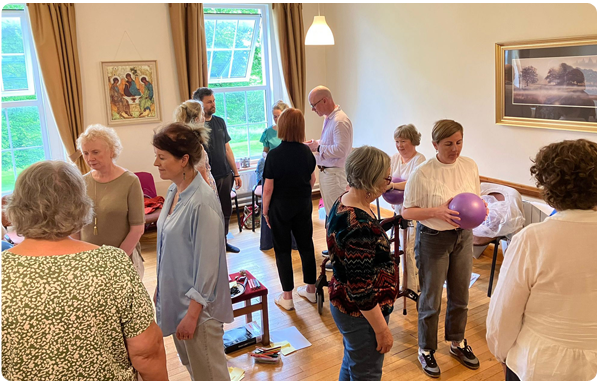
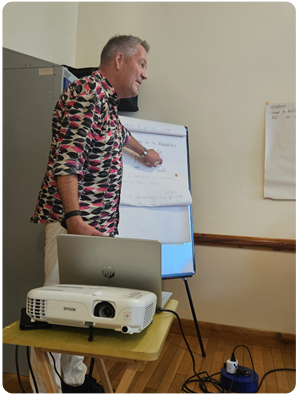
Planting an Olive Tree in Iceland!
by Margaret Quinn
Where to begin……
The story of how we found ourselves leading a training course for people who would facilitate a programme designed to promote resilience among refugees and asylum seekers in Iceland begins in another place and another time.
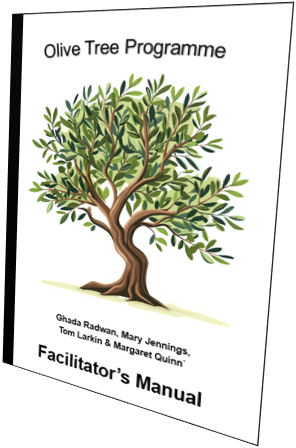 In 2011, Mary Jennings and Gerry Conway were invited to travel to Gaza to work with the Palestine Trauma Centre (PTC). The initiative was sponsored by the Quaker Community in Galway and the UK and had the aim of teaching basic Focusing skills to the personnel of PTC. In 2013, they returned to Gaza, this time accompanied by Rene Veugelers, to explore ways of using Focusing with children. The team then created a twelve session programme for community groups which would be offered by PTC. Delivery of that programme was led by Ghada Radwan, who translated the programme into Arabic and worked to ensure that it was culturally appropriate and included multi-modal approaches – using art and drama for example.
In 2011, Mary Jennings and Gerry Conway were invited to travel to Gaza to work with the Palestine Trauma Centre (PTC). The initiative was sponsored by the Quaker Community in Galway and the UK and had the aim of teaching basic Focusing skills to the personnel of PTC. In 2013, they returned to Gaza, this time accompanied by Rene Veugelers, to explore ways of using Focusing with children. The team then created a twelve session programme for community groups which would be offered by PTC. Delivery of that programme was led by Ghada Radwan, who translated the programme into Arabic and worked to ensure that it was culturally appropriate and included multi-modal approaches – using art and drama for example.
Over time, Ghada developed an interest in deepening her Focusing practice and becoming a Focusing Trainer herself. Her great desire was to share Focusing with others in Gaza, particularly those who could bring Focusing to their work as psychologists, teachers etc. Ultimately, she hoped to train Focusing trainers in Gaza. Mary undertook to support Ghada through her initial training process and became her primary mentor. It was during this time that Ghada connected with the newly emerging Irish Focusing Network. Some of you will have met her during online courses she joined during the pandemic.
Having completed her Focusing training, Ghada invited Mary, Tom Larkin and myself to support her in preparing a training programme to expand her work in Gaza. When we had completed the first part of this work, Ghada began to work with a group of psychologists. It was interesting to hear that they found the Focusing approach fresh and different. Many wanted to continue their training. We were beginning work on the second phase of that project when war broke out.
There are so many ways that work can be disrupted, or projects derailed – illness, relocation, personal circumstances. What actually happened was beyond anything we could have imagined. Not only did the work stop, but, for long stretches of time we lost contact with Ghada and were left wondering if we would ever hear from her again. We worried for Ghada and her family, we felt helpless to offer support other than the messages we sent. Destruction of the communication infrastructure in Gaza meant that very often those messages were met with silence. We would wait, sometimes for weeks, for any response which would let us know that they were still alive.
As the months passed and we watched the horror unfold, Ghada and her family were displaced several times, two of her nieces died when a bomb targeted a house close to where they were sheltering, food and water became more difficult to find and communication remained sporadic. Finally, Ghada, Mohammed, Eilia and Elite were displaced to a tent in Rafah.
Our Focusing project was stymied, so Ghada turned her attention to the other needs she saw around her. It came as no surprise to us to discover, in occasional messages, that she was supporting mothers in Rafah to access food and supplies for their babies. Accessing support from “Challenge to Change” she was able to help 50 families to keep their babies fed and clothed despite the awful circumstances. Above all, her energy was focused on keeping her daughters well and encouraging them to retain hope of a better future. She has told us that drawing on Focusing during this ordeal was a great support. As the assault on Rafah began, however, Ghada and Mohammed decided that, to protect their children, they had no option but to leave Gaza. The story of how this was achieved would take a novel and strain belief. Suffice it to say that the efforts of many friends and the brilliant co-ordination of efforts by Sigríður Þorgeirsdóttir, who works at the university of Iceland, and Donata Schoeller, who many of you know from her courses with the Focusing Institute, resulted in the family leaving Gaza on the day before the Rafah crossing closed for good – making departure impossible.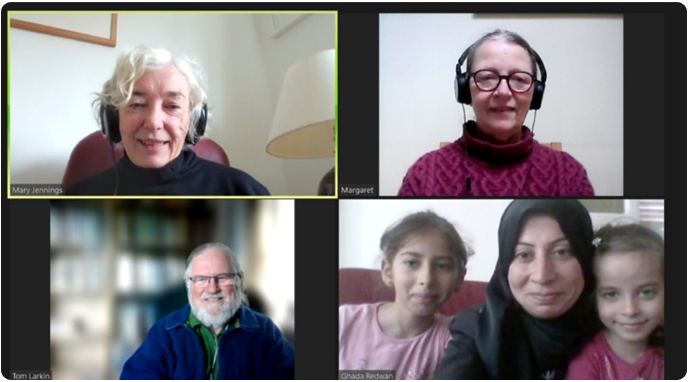
In Cairo, Ghada once again had access to the internet and I can still remember what it felt like to see her on Zoom during that first meeting. I remembered the story Ghada told us about the woman in Gaza who said “I am not waiting for death, I am seeking life.” This resilient little family despite having to leave behind home and family, sought to live meaningfully in this no-ones-land that was their time in Cairo.
This was when our shared project entered a new phase. Never one to waste time, or stint energy, Ghada wanted to offer some support to displaced Palestinians in Egypt. Our thinking was that we could best support them by creating a programme designed to reclaim or re-build resilience. The Olive Tree project was born.
While it was difficult for Mary, Tom and me to imagine how this could be organised, Ghada was already in touch with groups like “Challenge to Change” (a Swiss charity) and exploring ways to offer the programme to online to Palestinians in Egypt, Lebanon and Jordan. She’s not a woman to let the grass grow under her feet. We went back to our planning meetings and hammered out an approach which blended Focusing with Psychological first aid models, mindfulness practices and insights from neuroscientific research.
While it was difficult for Mary, Tom and me to imagine how this could be organised, Ghada was already in touch with groups like “Challenge to Change” (a Swiss charity) and exploring ways to offer the programme to online to Palestinians in Egypt, Lebanon and Jordan. She’s not a woman to let the grass grow under her feet. We went back to our planning meetings and hammered out an approach which blended Focusing with Psychological first aid models, mindfulness practices and insights from neuroscientific research.
As the work continued, it became clear that remaining in Egypt long term might not be possible and, thankfully, Ghada’s friends in Iceland again came to the rescue, supporting her application to study at the University of Iceland.
So what now for the Olive Tree Programme? Online offerings were a possibility, but how to do it? The programme was coming together and we believed it would be useful, but, as Gendlin might put it: “What’s possible now?”
We reckoned without the creativity and “go-for-it-ness” of Ghada, Sigríður and Donata as well as the generosity of the Icelandic government and “Challenge to Change”. An application for funding was successful and before we knew it, Ghada was asking us if we could be available to travel to Iceland to train a group of facilitators to deliver the Olive Tree Programme to Arabic speaking refugees and asylum seekers there! Who could say no?
In late May, as we took our seats on the plane, Mary turned to me and observed – in a tone of complete astonishment – “We’re going to Iceland!” There had been so many obstacles and challenges along the way. What had started out as “notes for Ghada” had to become a manual which would be accessible to people who knew little or nothing about Focusing – it took months! This new iteration of the programme also involved adding a layer of facilitator training – another manual for us - no small task in itself. Then there was the organisational end – travel arrangements, venue and the rest – all brilliantly handled by Una Þorláksdóttir. The decision to proceed was not without its worries either. We were setting out to offer training to a group we had never met, about whom we knew very little except that several of them worked with Arabic speakers through the Red Cross or Municipal authorities in Iceland. A small number of the group were Icelandic and were familiar with Focusing or TAE.
We need not have worried. From the moment of our arrival, our Icelandic friends went out of their way to make us welcome and to ensure we had every support for the work. Ghada, Mohommed and the girls welcomed us like family and it was wonderful to have an opportunity to spend time with them. We are grateful to Sigríður, Una, Elsa and Gugga for all they did to support this project. And then there was the group of trainees….. welcoming, interested, engaged – all we could have hoped for. The six day training was intense and demanding. They met every challenge and working on the programme became one of those wonderful experiences of collaborative effort.
We are currently in conversation with this group as they prepare to offer the Olive Tree Programme to their clients. Translation into Arabic and (we hope) Icelandic is underway, which will make this easier for the facilitators and more accessible for those who can benefit most. What the future holds for the programme is an open question, but our experience over the past several years, particularly the most recent, have left me thinking that anything could happen – and feeling open to that. For now, it is enough that this lovely group of people will carry the programme forward in Iceland while we explore how it might make an impact in Ireland and/or elsewhere.
Reflecting on the entire experience, I am, above all, grateful that this project offered a way to do something useful at a time when – perhaps like many of you – I felt utterly helpless in the face of the daily images from Gaza. That the situation continues to worsen by the day still shocks and horrifies me. Ghada remains deeply concerned for her family members who are still in Gaza – suffering the fear and privation we see on our screens every day. This project is, for me, an attempt to light a small, frail light in an encircling darkness and I am deeply grateful for that. As I am grateful for the opportunity to work with Ghada, whose resilience, determination and generosity continually leaves me awestruck – and inspired.
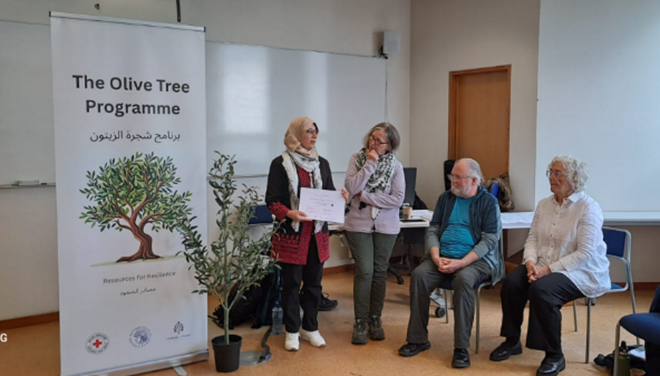
From left: Ghada Radwan, Margaret Quinn, Tom Larkin, Mary Jennings.
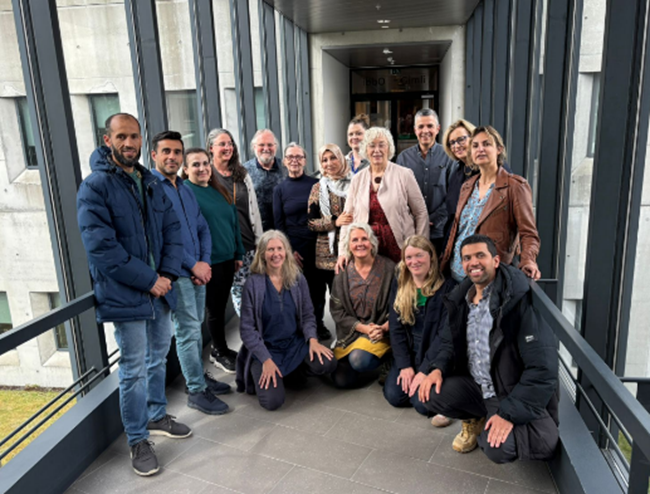
In front, from left: Guðrún Arnalds, Helga Arnalds, Guðbjörg Jóhannesdóttir, Osama
Mubarak Al Hijazy,
Standing, left to right: Ahmad Seddeeq, Mohammed Raheem, Reema Abdalhakeem, Kerryn
McMurdo, Tom Larkin, Margaret Quinn, Ghada Radwan, Elsa Haraldsdóttir, Mary Jennings,
Salah Kareem Mahmoud, Sigríður Þorgeirsdóttir, Soumia Islame
Here is a wonderful documentary on our project
IFN Committee Update - Sept 2025
by Therese Ryan
Welcome back everyone. We hope you had a wonderful summer and we’re looking forward to seeing you again very soon.
Our weekly online gatherings will recommence on Wednesday, 3rd September. Please take a moment to revisit our Guidelines as we get ready to Focus together again. If you require any support or advice in relation to these sessions, please email This email address is being protected from spambots. You need JavaScript enabled to view it.
Our weekly zoom sessions couldn’t happen without our zoom hosts. Many have been volunteering for quite some time. We recently sent out a request for new hosts. Many thanks to those who responded. The more hosts we have, the less often each person needs to host. Might you be willing to step forward and become involved even for a few months? If the tech side seems daunting for you, we will happily support you as you become familiar with hosting. This might be the perfect opportunity for you to contribute to our network - please get in touch if you’re interested in finding out more.
We’re happy to share the news that our Focusing Refresher evenings will return. They are a fantastic opportunity to develop and deepen our Focusing practice in community. If you haven’t come before, please join us on the last Zoom session of the month. Everyone is welcome, whether you have a lot or a little Focusing experience. We’re very grateful for our Focusing trainers who voluntarily facilitate these sessions. If you’re a Focusing teacher and would like to volunteer to lead a session, please let us know.
We look forward to seeing some of you in person at our Autumn Gathering on September 27th at the Dominican Retreat Centre in Tallaght, Dublin. Something magical happens when we come together on these days. We have two wonderful workshops planned and would be delighted to have you join us. More details below.
Next year, 2026, will be the centenary of Gene Gendlin’s birth. To celebrate this event, The International Focusing Conference will be held in Gene’s birthplace Vienna, from 3rd to 7th June 2026. Some members of the network are already planning their trip, you might like to join them. You can find more details here.
IFN Committee Update - May 2025
Our Focusing Refresher evenings have been running since last September. Each month we've had an opportunity to sense into a different aspect of Focusing in partnerships. We're very appreciative of our Focusing trainers who facilitated these evenings. The last Refresher session (and our last zoom session) will take place on Monday 30th June. Fiona O'Meara will facilitate The Power of Prompting: Ways of reflecting without interrupting the process.
Earlier this year our new Guidelines for Zoom Focusing Sessions were shared by email with all our members. The guidelines, which can be found on our website (by clicking here), were drawn up by the committee in order to nurture and maintain a sense of safety within our community and to promote respectful connection. If you haven't already done so, please take time to read the guidelines.
Finally, we are very excited to host a Children and Focusing Introductory day in Dublin with Rene Veugelers and Elaine Goggin on June 28th. We invite you to support this initiative in whatever way you can - by attending or by sharing the news of the event with your family/friends/colleagues and on social media. This day is open to everyone including those who don't know Focusing so this is a great opportunity for us all to spread the word about Focusing within our communities and to reignite interest in Focusing with Children in Ireland.
Where ever you are in the world, we wish you a beautiful summer and look forward to reconnecting with you on line in September.

Photo from our May Skills Refresh Evening with Therese Ryan
Creative Corner: I know she is with me always

It was a during a Focusing session when I described that I felt I was stuck in a maze .. not knowing if I should go forward or back. But I also seeing that there was ahead of me a hand reaching out to help pull me through. When I imagined who’s hand it was .. I knew it was my own. My wiser, compassionate self was there to pull me out of my stuckness.
So here I am in two different forms. The wiser, surer self, holding a candle to light the way and placing her hand on the shoulder of she who feels fragile or lost. And again, here I am, leaning into my wiser self, holding all my love in my hands, trusting she will care for it. We are both surrounded by birds, leaves, flowers and stars.
When do you meet your own wiser self? How does she or he show up in your life? What do you see in their eyes?
Denise Durocher, May 2025
The Folio: A Journal for Focusing and Experiential Therapy
by Tom Larkin

As Michael Caine would have said (in a cockney accent) “Not a lot of people know that” Know what? About The Folio! The what? The Folio!
The Folio certainly is a hidden treasure – it was a journal published irregularly between 1981 and 2016 by The International Focusing Institute (TIFI). The early editions were largely a collection of articles written by Focusing people about a variety of topics related to the theory and practice of Focusing, now scanned, collected together and available on the TIFI website. The later issues adopted a more thematic approach with each issue concentrating on a particular area or topic from a Focusing perspective. These are also available as pdfs on the TIFI website. In these later Folios the articles are easily accessible and can be read individually. Topics included, among very many others:
- Focusing and Spirituality
- Focusing and Fear
- Focusing and Medicine
- Focusing with Children
- Thinking At the Edge
- Interactive Focusing
etc.
The full list of what is available to view in pdf form is at https://focusing.org/folio
Each issue contains a broad range of views, perspectives, experiences and reflections, some theoretical, some philosophical, some personal, some practical and all interesting and informative. The perusal through the contents pages of each issue will reveal a wealth of fascinating articles by some of the big names in Focusing including Eugene Gendlin and Ann Weiser Cornell.
This will be especially useful for people engaging in any research or academic study of Focusing or for someone who wishes to follow a thread over time e.g. articles about Focusing and Nature or Focusing and the Body. Or for the casual, curious Focusing reader, you can just dip into an issue and perhaps uncover some gems of insight and wisdom. Whatever the motive you are sure to find something worthwhile and of interest among them.
Besides the special issue on ‘Thinking At The Edge’, some of my personal favourites, to name just a few, include:
- Resonant Sensing for Peace – Listening to Our Planetary Being by Eric Lorup and Bruce Nayowith in Vol 27 Part 2
- Heartfelt Connections by Kevin McEvenue in Vol 26
- The Implicit transformational Power of the Background Feeling in Focusing by Marine de Fréminville in Vol 21
- A Seventh Movement: The Action Step by Atsmaout Perlstein and Bilha Frolinger in Vol 21.
In fact, Vol 21 was a particularly rich volume. It was the Tribute Issue; Celebrating 30 years of Focusing 1978 – 2008.
Accessing The Folio: All Folios are available for free to paid members of TIFI however you will need to be logged in to view them. There are still some Folios are available for purchase in hard copy. Contact This email address is being protected from spambots. You need JavaScript enabled to view it..
Focusing and the Frequency Illusion
by Clare Myatt
If you’re reading IFN’s wonderful newsletter, you’re probably already a devotee (is that the right word?) of focusing. I most definitely am a devotee (it’s the right word for me). To say it has been transformational in my life sounds rather grandiose, but that’s the truth of it.
 From the first training with Jerry Conway many years ago, to the latest seminar given by Ann Weiser Cornell at the Somatic Approaches in Therapy Summit [April 2025], my life is pervaded by Eugene Gendlin’s seminal philosophy. It’s a bit like the red mini effect - that tendency to see a red mini then see almost nothing but red minis thereafter. Apparently, this is the frequency illusion, more accurately described as the Baader-Meinhof Phenomenon.
From the first training with Jerry Conway many years ago, to the latest seminar given by Ann Weiser Cornell at the Somatic Approaches in Therapy Summit [April 2025], my life is pervaded by Eugene Gendlin’s seminal philosophy. It’s a bit like the red mini effect - that tendency to see a red mini then see almost nothing but red minis thereafter. Apparently, this is the frequency illusion, more accurately described as the Baader-Meinhof Phenomenon.
I recently attended one of Dr. Jim Feil’s online workshops on the topic of entanglements and getting oneself disentangled. The step from entangled to disentangled involves - you’ve guessed - pausing, taking a step back, finding exactly the right distance to be with entanglement. Hm, I thought, focusing.
I also attended one of Dr. Richard Schwartz’s online workshops on Internal Family Systems. He provided a demonstration with someone working with the part of her that says yes too quickly. In the process of the demo she identified another part which is annoyed because it would prefer to have time for more fun. Then she spent time holding both until such time as they were willing to talk to one another. Sound familiar? Looks like focusing to me.
The essence of focusing appears in poetry as well and thanks to IFN’s Marie McGuigan, I’ve found Julia Fehrenbacher’s poem The Most Important Thing. I think she’s captured the essence of focusing, as did Rumi in The Guesthouse, and John O’Donohue in For a New Beginning.
As I wrap up this review of the red mini effect, I’d like to share four words with you: “sneaky wee” and “sneaky pooh.” They do make me smile. Michael White was an Australian therapist working with children who wet and soiled the bed, and he created something called narrative therapy. His approach sought to externalise the problem - instead of the child being the problem, the problem was the problem. What a difference that made! It reminds me of Gendlin’s making space between the self and the problem:
“You welcome anything that comes…but you stay a little distance from it. You’re not in it, but next to it…you are neither running away or going into it…you sense there is space between it (felt sense) and you. You are here and it is there. You have it, you are not it.” [emphasis added]
I feel so blessed to have the red mini effect of Gendlin’s philosophy in my life. Everywhere I look, there he and his wisdom prevail. I also appreciate being part of the Irish Focusing Network - a beautiful and supportive community of like-minded folk - thank you.
BIO
Clare Myatt, LL.B., M.A., is an experienced practitioner using the lens of somatics/embodiment to inform her integrative coach-therapy. She was certified as a Focusing Practitioner in 2018, in Focusing Oriented Therapy in 2023 and published her first book in 2019 Love & Imperfection: A Therapist’s Story.
www.claremyatt.co.uk
This email address is being protected from spambots. You need JavaScript enabled to view it.
Focusing in Everyday Conversations – a Sort of ‘Six-steps’ Approach
by Mary Jennings
May 2025
Bruce Gibbs, a student of Gene Gendlin, taught Focusing by a method he calls ‘instances’ rather than through Gene’s better known six steps. He would start his first class by asking how they might react to seeing the flashing lights of a police car right behind them in the rear-view mirror. Straight away, everyone was able to identify the visceral body-feel and the feeling-feeling of that! They recognised that sense of ‘something’ that was not, as yet, quite clear: a felt sense was forming.
He would start by first helping them elicit a felt sense, as in the example above, then support them to explore further as they became more aware of their own capacity to sense more. They were learning Focusing by exploring something that they already knew, rather than starting by having to learn some unfamiliar technique such as the Gendlin six steps.
Lessons from Bruce Gibbs’ approach
Suppose we were to follow Bruce’s example and, in everyday conversations, be in there with the notion that felt-sensing is frequently, but not always, in play and if it is not, it can be encouraged. In other words our default mode is, ‘people are felt-sensing beings - let’s treat them like that.’
You might recognise that people are in this felt-sensing mode by noticing hesitations, uncertainties (a fuzzy edge)… they may pause…. they might use phrases like, “it’s like that time when,” or use metaphors or similes – “it’s like a fly you can’t catch – that kind of feeling…”. They are searching for the felt sense of what this is all about.
In this situation, you know they are in what philosopher and Focusing teaching, Greg Walkerden, calls ‘experiential depth;’ in effect they are felt-sensing, using this innate capacity of human beings quite naturally. If it feels right, you might use some of the following ‘steps’ as gentle invitations to them explore their felt sense. These include:
Six things you can do or say to support the felt sense to unfold in others:
- “Can you say more about that….”
(when you are noticing some hesitation)
- “It’s like a fly you can’t catch…”
(Saying back the key feeling/sensing/crux words in reflective listening)
- “In the example/story you are speaking about, it is a kind of … flexibility.. you are hoping for – something like that or…?”
(giving your best guess – knowing you are correctable).
- “Have you seen that kind of flexibility you are speaking about in other situations?”
(looking for more examples or instances of what they are pointing to; this helps to allow a felt sense to come more into focus and brings greater clarity)
- “What would you like this word –‘ flexible’ - to mean here?”
(knowing words are in context and they can carry many meanings – you are allowing the person to mean what they say, here, in this situation)
- “What comes to me about all this is….
( tentatively offer something that comes from your felt sense of the situation they are describing – how their experience lands with you: It’s not advice, not suggestions, definitely not ‘let me tell you my story’! Instead, you are offering an empathic moment, one human being in interaction with another, and the person may go deeper…)
Of course, you would not use all of these ‘steps’ in any one conversation. They are offered here as a way to experiment with bringing a focusing-orientation into everyday conversations, particularly when you have the clear sense that the other person in the conversation is in a natural, ‘felt-sensing mode’ or at some level of ‘experiential depth.’
It may support them to go deeper, or to facilitate them to pause, to spend time with an often-elusive ‘felt sense of all that,’ all the while having a natural conversation.
It becomes easier when we have felt-sensing as part of our way of being. This is not about being performative or trying too hard. It has to be natural – and that comes with time and practice.
At times, this approach may be totally inappropriate or confusing for the other person. It has to come from a place of deep presence and deep listening. Below are some guidelines to help you consider when to use/not use these ‘six steps.’
A framework to guide you
Greg Walkerden has some good advice on how to go about bringing these ‘steps’ into a conversation. A summary of the framework he has developed is below:
- Wait to see if something that seems helpful comes from your felt sense
- Be tentative, make it easy for the person to NOT follow your lead
- If they don’t, relax into appreciating that it seemed like a helpful suggestion, but it’s ok if it is not
- If you feel a soft 'no' to something you are doing or are about to do, pause, back up, and freshly consider a way forward
The final word: try it, experiment, you might find your conversations become a lot more interesting!

Mary's 3 week course was well received recently with The International Focusing Institute
Worlds of Focusing: Focusing With Your Whole Body

Each Newsletter will explore an aspect of the Focusing World you may not be familiar with. In this edition we will explore the world of Whole Body Focusing.
We are delighted that WBF Trainer Addie Van Der Kooy, took time to write a piece on Focusing with your whole body.
This writing starts with a deep appreciation for Kevin McEvenue, who about 45 years ago, intuitively began combining his work as an Alexander Technique practitioner with his work as a Focusing trainer. He called it Wholebody Focusing (WBF).
For instance, the observation by F. M. Alexander that the body has to come alive as a whole in order for change to happen in a part of the body, has deeply shaped an emphasis in WBF on taking time to become aware of your body as one breathing, living whole, earthed and energised by your larger physical surrounds (ultimately Mother Earth). This then allows your body to become a safe, well-resourced holding space in which to welcome any part needing your Focusing attention.
So, let me briefly take you through what a WBF session might look like.
See yourself as a host preparing yourself before opening the Focusing door to any guests. You first of all take some time to let your body and mind unwind any tensions.
By letting yourself be completely as you are, your mind can come to rest in the Is-ness of each moment.
By simply allowing yourself to feel held by the chair and the ground beneath your feet, your body can also unwind and in that new-found space, it can come alive to its natural energetic connection with the Earth beneath your feet - a ‘six sextillion (that’s a six followed by 21 zeros!) metric ton battery. Not a bad energy supply!
You may also want to welcome a felt sense of anything supportive and nourishing in your surroundings, e.g. day light streaming into your room, a plant or a painting, whatever speaks to you in a supportive and connective way.
If you wish, you can also unwind and resource by felt sensing the flow of your breath, noticing the rhythmic release and ‘emptying out’ (exhale) and the body being re-filled with fresh, new energy (in-breath).
And, given some time, you may also begin to felt sense the ‘Hum of Life’ inside you, a natural sense of aliveness subtly vibrating as an inner energy field throughout your body - a felt sense of being alive and present in this moment, separate from thoughts, feelings, physical sensations and underlying any “packages” that may want some Focusing attention.
You’ve now let your whole body come alive in a new, resourced way; by doing so, you’ve come into a felt sense of You as Alive Presence, an embodied sense of Self in Presence.
You and your whole body are now ready to begin to host any guest that may knock on the Focusing door. There is an embodied sense of You in Presence and there is the alive, whole body into which a felt sense of your guest can be safely welcomed.
There is the fully embodied ‘You’ and there is ‘It’, the Felt Sense, and between the two there is a little distance, space. And in that space a natural interchange may occur which we call Focusing.
Quite often, deeply stored and painful places, like unprocessed trauma, need to feel the aliveness of You in Presence directly within your body. These un-processed ‘felt memories’ are stored in our bodies like time-capsules, carrying the painful ‘unfinished’ past with us into the present moment. And from their past they are reaching out for a body ‘scent’ of the aliveness of You in the Here & Now; it was exactly the absence of Presence at the time of the trauma that caused the overwhelm and subsequent need for ‘freezing over’ of the trauma.
And when you can become aware of a felt sense of the trauma place alongside a felt sense of You in Presence, a special dynamic emerges in which deep healing shifts can take place. In WBF it is called Holding Both with Equal Positive Regard. A previously disconnected trauma wound can now begin to feel itself safely held in relationship to your embodied Presence. This sets in motion a process of Homecoming or Rejoining in which the suffering place can open up and awaken to its own knowing how to move forward in its healing journey.
“When a part of me feels loved, it awakens to its own healing”
- Kevin McEvenue, founder WBF
A Homecoming in Ardpatrick – Spring Gathering of the Irish Focusing Network
by Marta Fabregat
On Saturday, April 5th, 2025, the Irish Focusing Network gathered in the welcoming heart of Ardpatrick, Co. Limerick, for our Spring Gathering, a day filled with rich connection, deep listening, and a sense of coming home.
Hosted at the Ardpatrick Community Centre, the day offered two beautifully held workshops: in the morning, Me and My Best Friend, facilitated by Elaine Goggin, invited us into a gentle exploration of our relationship with the Inner Critic, what it is trying to protect, and how it might be met with curiosity and compassion. Above all Elaine brought us to a place of joyous contact with that aspect of us that loves dearly.
In the afternoon, Rennie Buenting guided us through Finding your Way with Parts, drawing on the practice of Inner Relationship Focusing to meet and listen to the many voices within us with respect and kindness. Rennies workshop brought a sense of beginners mind, like less is more when we are listening to all that is there.
But what truly stood out was something even more powerful that took root: a profound sense of welcome. Elaine’s presence, along with the participation of her family and the wider Ardpatrick community, was woven into the very fabric of the space, creating a feeling that’s hard to put into words. It was as though we hadn’t just arrived at a venue; we had arrived at someone’s home, a place held with care, maturity, and a deep openness to whatever might unfold.
There was a kind of quiet joy in the air, a grounded warmth that made space for new connections and renewed ones, for laughter over shared meals and deep silences in shared practice. Many of us commented on the love we felt, not only from Elaine, but from the land and the people who live there. There was a sense of being received by a well-rooted, vibrant community that has found its own way of living and learning together, open and permeable. As one participant reflected, “I felt like a guest in someone’s home and also like I belonged.” That might best describe the spirit of the day that I am sure for those of us who met in Ardpatrick it will be always a memory that keeps informing us.
A heartfelt thanks to Elaine and her family in Ardpatrick for reminding us of the beauty of Focusing not just as a practice, but as a way of being together in the most gentle and ordinary way.
And thank you to all the wonderful Focusers who were there, making this such an unforgettable day.
Our next In-person Gathering will be in Dublin in the Fall: on the 27th of Septemeber 2025 in the Dublin at the Dominican Retreat Centre in Tallaght.

Gendlin Movie Bites Gatherings
 Who doesn’t love Mary’s moments of inspiration, especially when it doesn’t involve you having to do anything except show up and enjoy! One of Mary’s more recent bright ideas was to hold a movie night featuring Eugene Gendlin's work captured on video, which the International Focusing Institute had complied on their YouTube channel. Many of the clips involved the generosity and tremendous work of Nada Lou. Nada carefully combed through hours of footage of Gene sharing his wisdom with groups, and condensed it down into digestible bites to nourish us all.
Who doesn’t love Mary’s moments of inspiration, especially when it doesn’t involve you having to do anything except show up and enjoy! One of Mary’s more recent bright ideas was to hold a movie night featuring Eugene Gendlin's work captured on video, which the International Focusing Institute had complied on their YouTube channel. Many of the clips involved the generosity and tremendous work of Nada Lou. Nada carefully combed through hours of footage of Gene sharing his wisdom with groups, and condensed it down into digestible bites to nourish us all.
Key themes were on how listening, which Gene learned from Carl Rogers, became such an important feature – it didn’t feature in the first stage of Focusing, strange as that might now seem. We heard Gene on Focusing Partnerships, on his concept of ‘carrying forward’ and his emphasis on ‘action steps.'
Nada-remarked at one stage that her husband felt like Gene lived in the house with them as he heard so often, while editing the videos. We were honoured to have Nada as a guest at the Irish Focusing Network Gathering which was a wonderfully light and informative evening for us all. Mary’s careful selection of videos held a really nice Focusing flow through the themes.
Nada carefully combed through hours of footage of Gene sharing his wisdom with groups, and condensed it down into digestible bites to nourish us all. Nada remarked at one stage that her husband felt like Gene lived in the house with them as he heard so often. We were honoured to have Nada as a guest at the Irish Focusing Network Gathering which was a wonderfully light and informative evening for us all. Mary’s careful selection of videos held a really nice Focusing flow through the themes.
Following on from the Irish Focusing Network evening, Mary held a Roundtable on it for TIFI and again it was very well attended and thoroughly enjoyed by all. It was a very engaging experience, with some interesting contributions on Gene’s philosophy and how that influenced the shape
of Focusing as we know it. Nada very graciously answered questions about clips and broadened our
perspective on Gene’s wisdom.
We are grateful to Mary for opening the door to what feels like a beginning of further gatherings like this together. And if you want to do another one Mary, I'll have the videos ready for you without ads!
Here is the link to the section of the TIFI website that hosts many videos featuring Gene talking about a range of topics - Gene Gendlin Videos- Click here. We hope you enjoy exploring more.
Below is a list of the videos we viewed on at the event with a link to the TIFI YouTube channel where they are hosted. We invite you to explore these in your own time and it might be worth hosting your
own ’movie bites’ and sharing the wisdom – and may popcorn with some Focusing friends.
1. Why Focusing works and what it is not
2. On listening, reflecting and on Focusing Partnerships
- What I learned from Rogers - with Eugene Gendlin Ph.D.
- Gene Gendlin and Lynn Preston on Reflecting
- The Pros and Cons of Focusing Partnerships
3. On carrying forward and action steps
4. On Focusing and teaching Focusing

Irish Focusing Network Movie Night - 27th November 2024

The International Focusing Institute - Roundtable 28th January 2025
Written by Elaine Goggin
IFN Committee Update Feb 2025
Spring is almost here and along with the lengthening days, we look forward to our annual Spring gathering which will take place on 5th April in Elaine’s home village of Ardpatrick Co Limerick. Please save the date. We look forward to seeing many of you there.
Our AGM which took place in January provided an opportunity to reflect on 2024. In April Marta Fabregat kindly hosted a beautiful day in Gort, Co Galway. Our Autumn Gathering took place in the Dominican Centre in Tallaght in September.

AGM 2025 Screenshot
We also had an active year online. In May, Gordon Adam from the British Focusing Association facilitated an evening with the theme of Focusing in community. In November, Mary Jennings facilitated a Movie Bites evening where we viewed video clips from the TIFI library. We were privileged to have Nada Lou join us for that evening making it a very special occasion for our network.
Much appreciation was expressed at the AGM for the many activities and resources offered by members: the bi-monthly poetry evenings, our weekly zoom sessions, and of course our wonderful newsletters. Many have also enjoyed listening to the Focusing Pathways podcasts.
A desire to encourage and develop good Focusing practice led the committee to organise a series of monthly Listening Skills Refresher evenings which were generously facilitated by our wonderful Focusing teachers. The dates of upcoming evenings are March 31st, April 28th and May 28th. We’ve been delighted and encouraged by the attendance and would love to see them continue. If you’re a Focusing teacher and would like to facilitate a Refresher evening in the future, please get in touch.

Screenshot from Anne Lawerence's class

Screenshot from Therese's Ryan's class
Our heart-filled thanks to everyone who supports the network: those who facilitate the workshops for our in person gatherings and our online events including our Refresher evenings, to our zoom hosts who keep the weekly zoom sessions going smoothly, and to those who produce our newsletters, as well as the committee who work behind the scenes.
Suggestions offered during the AGM included: an email address for raising specific concerns which may arise, the possibility of organising a conference or larger workshop to promote Focusing and support the growth of our network, a space for sharing the rich Focusing stories of our members.
The committee is currently drawing up guidance for good Focusing practice in order to nurture and maintain a sense of safety within our community and to promote respectful connection. We will be sharing these guidelines with you all by email in the coming weeks.
It’s the time of year to renew your membership, so if you haven’t already done so, please take the time to register using the link by clicking here.
We are delighted to welcome some Focusing friends from Iceland to our network. Please look out for them at the zoom sessions and make them feel welcome.
Finally, we encourage you to consider how you might contribute to growing and developing our network. It may be helping out with the newsletter, becoming a host for our weekly zoom sessions, offering a workshop online or at one of our in person gatherings, or spreading the word about Focusing. There are lots of opportunities to become involved. We depend on all of you, our members, to keep our network alive and growing and thriving. Thank you for your ongoing support and commitment.
The committee members are:
Chairperson Therese Ryan
Secretary Kay McKinney
Finance Officer Peter Duffy
Elaine Goggin
Marta Fabregat
Worlds of Focusing: Interactive Focusing
Interactive Focusing is a form of Focusing that was developed by Janet Klein (d. 2010) with the help of Mary McGuire. IF has been described as a ‘third stage’ of Focusing, beginning with Focusing alone, then Focusing in partnerships and now Interactive Focusing.
Janet developed Interactive Focusing while working on a PhD in Psychology. For her thesis she focussed on Focusing partnerships.
She observed and interviewed Focusers who had long-term, ongoing Focusing partnerships. For their exchange, she asked the partners to Focus with ‘what their partnership and their partner meant to them. She discovered that these Focusers hadn’t ever articulated what this meant to them before. In addition, she realised that Focusing partnerships were, in fact, interactive even though “there was a strict prohibition against touching the material of your partner”.
She describes it this way, “The partnership was set up on the lines of a transaction, two equal but separate pieces. The listener was to clear the space of her own issues in order to make room to listen to the Focuser. When they exchanged roles, the second Focuser wasn’t to touch on the material of the first Focuser. It became apparent to me, however, that there was a subterranean interaction, though it never had a chance to surface due to the prohibition. I wanted to frontally address this unspoken aspect.”
As a result of her findings, she created a structure, Interactive Focusing, (IF) that would allow for interaction while ‘preserving each person’s material and boundaries’. Following this kind of interactive process would allow the partners to safely process their relationship, if they wanted. Barbara Dickinson describes it thus, “A regular practice of IF creates a sort of “space” between two people where they can bring their individual issues as well as issues that affect both people in the relationship.”
There are several stages to a full IF process. The following is but a very brief description. See below for further reading/resources.
An IF session begins in a similar way to a usual Focusing session; one person Focuses first for the agreed time while the other person listens/reflects. Then, in a departure from most Focuser’s experience, at the end of that part the listener offers an empathic response to the Focuser, usually in the form of a symbol. The Focuser responds to this. This form of Focusing requires that the Focuser say enough during their time so that the listener can actually respond. (In my experience, more and more long-term Focusing partners are bringing this element into their Focusing exchanges.)
Then it is the turn of the second Focuser, who begins by checking inside to see what has touched them from the session so far. They then continue in the usual way to explore their experiencing while the second listener listens/reflects. At the end of that, the second listener offers an empathic response and the Focuser responds.
After the above and to close the session, both partners in turn now have a ‘relationship check’. Each partner addresses the following questions or similar in a Focusing way; “How am I with myself?” and “How am I with my partner?” while their partner listens/reflects.
 As well as helping to deepen the relationship between Focusers, particularly those who know each other well, Interactive Focusing process can be used for dealing safely and effectively with conflicts and for healing troubled areas in relationships.
As well as helping to deepen the relationship between Focusers, particularly those who know each other well, Interactive Focusing process can be used for dealing safely and effectively with conflicts and for healing troubled areas in relationships.
If you would like to explore this form of Focusing further you can check out the websites below. The book on the method is available from TIFI bookstore and Nada Lou has a video of Janet and Mary Maguire explaining, explicating and demonstrating the process. If you would be interested in an introductory, day-long, in-person workshop to experience this method please contact me at This email address is being protected from spambots. You need JavaScript enabled to view it..
Further Reading and Resources
https://focusing.org/more/dr-janet-klein
https://www.youtube.com/watch?v=tOfIpVpY1Ek&ab_channel=LynnPrestonFocusingRelationalPsychotherapy
https://focusinginternational.org/resources/interactive-focusing/
https://learnfocusing.org/en-gb/pages/interactive-focusing-resources?_pos=1&_sid=69ae60f9f&_ss=r
https://www.cefocusing.com/wordpress/interpersonal-focusing-kleins-interactive-focusing-protocol/
BOOK REVIEW: Self Therapy: A Focusing Guide
Campbell Purton – Self Therapy: A Focusing Guide. Athens: Eurasia Publications (2022)
Campbell Purton is an English Focusing teacher. His career somewhat mirrored Eugene Gendlin’s in that he studied philosophy to PH.D. and then trained as a person-centred counsellor and Focusing teacher.
The cover of this relatively short book shows Rodin’s sculpture, ‘Le pénseur/The Thinker’ – an apt image for how, in his introduction, Campell describes Focusing as “giving sustained attention to our trouble in a way that leads to steps of change" (p.15). He also suggests that in the sculpture’s stance of stillness and apparent waiting and attending, Focusing may be likened to a kind of ‘pondering’ (p.109).
While set as it were in the world of psychotherapy it is primarily a book about Focusing and more specifically Focusing alone. At the outset he says that the book is intended as a self-help guide to working with the kinds of difficulties that move people to seek counselling help. From a therapy perspective he sees Focusing having a place alongside psychotherapy in the same way that complementary medicine can have a place alongside traditional medicine and possibly as a way of continuing the process after formal therapy sessions have ended. His first chapter is a broad, wide-ranging review of the psychotherapeutic scene particularly in the UK and of Focusing Oriented Therapy.
In the following three chapters Campbell, adopting the Gendlian approach, explains and explicates the classic six movements of Focusing, along with an exploration of some of the difficulties that can arise and how to work with them. He provides a wealth of examples of Focusing experiences, some of them quite detailed. He points particularly to the role of metaphor in the process and draws on the analogies and metaphors of Lu Ji a third century, Japanese lyric poet.
There are some aspects of Focusing that he repeatedly emphasises throughout the book; the usefulness and effectiveness of Focusing in everyday life; deliberately not attending to the familiar details of a problem or difficulty when beginning a Focusing session; “… keeping of our attention on the problem as a whole, while allowing new details to emerge” (p.37); “attending, not so much to what is already there, but to what is on its way, or what could come if we give it a chance” (p.38).
Chapters dealing briefly with Trauma and with Moods and Medication are interesting and informative. In regard to the former particularly, while he commends the use of Focusing he urges caution about going it completely alone. There follows an important chapter on Action Steps, an often glossed-over or neglected aspect of Focusing. Finally, there is the chapter called ‘How does it work?’ which he says is for those people who are curious about what is involved in the process of Focusing and which looks at some of its more philosophical aspects.
Though he writes in a deliberate, methodical way, as becomes a philosopher, the book is very accessible. It is probably most suitable for counsellors/psychotherapists and people who have already begun their Focusing journey or/and those who have some familiarity with the process. Experienced Focusers would benefit from his distinct perspective on Focusing. I think this is a welcome and helpful addition to the growing library of books on Focusing.
Campbell has written a number of books on therapy and Focusing and many articles on Focusing, Buddhism and Philosophy (see his website for a list and access - http://www.dwelling.me.uk/focusing.htm)
Written by Tom Larkin
Measuring the effectiveness of Focusing-Oriented-Coaching
Focusing is a relatively new concept in the world of coaching, yet there are many commonalities between the two which makes their crossing exciting and full of possibility. Both Focusing Oriented Therapy and Coaching are forward moving ways of working, in which the core belief is that the client has their own answers and the coach/listener uses the skills of deep listening, to support naturally occurring change and forward moving energy.
MEASURING THE EFFECTIVENESS OF FOCUSING-ORIENTED COACHING
To evidence the effectiveness of Focusing-Oriented coaching, Báirbre Meehan undertook a self-funded five-year research project. Working with GPs, psychotherapists and word of mouth referrals, Báirbre supported and monitored Mental Well Being improvements in over 100 people across one-thousand one-on-one coaching hours.
The objective of the project was to measure the impact of a short-term Focusing-Oriented Coaching approach on the Mental Well Being (MWB) of participants, individually and collectively. In doing so, the research served to establish how best to cultivate practices of awareness and understand which tools and strategies best support individuals to assess, manage and maintain their own MWB.
Using a quantitative MWB measurement tool, the Mental Well Being of each participant was assessed at the start, end and six months after the intervention, enabling us to measure the individual and collective MWB change over time.
Results of the 8-hour coaching intervention showed a 70% improvement in collective MWB at the end of the intervention, with the improvement being maintained both six months and two years after the intervention period. The following graph shows the results.

As significant as the above measurements were, the testimonials from participants were even more important. A sample are shown here. For more testimonials from research participants and from referring professional, visit Báirbre’s website https://www.pause.ie/research/

Báirbre’s coaching journey began 12 years ago, at a time when her personal-development journey led her to Focusing. Her coaching practice is informed by 25 years in people management in roles such as CEO, organisational/leadership development and finance director … and many more years in the roles of daughter, mother, wife, sister, friend, coach etc..
Focusing-Oriented Coaching is Báirbre’s passion and she is devoted to developing and sharing it. Báirbre teaches Focusing-Oriented Coaching programs to coaches and is a coach supervisor.
If you are a coach and interested in learning how to integrate Focusing into your practice or if you are looking for a coach who works in a Focusing way, contact Báirbre at This email address is being protected from spambots. You need JavaScript enabled to view it.
A Retreat on The Joy of Samhain.
A Retreat on The Joy of Samhain. Offered by: Deirdre Ní Chinneide, Fr Philip Baxter and John Keane at Ards Friary, November 2024.
A celebration of music, nature and the body as it is sensed from the inside.
Written by: John Keane.
This weekend retreat explored the Celtic Celebration of Samhain using the themes of Darkness and Light to appreciate the changing nature of reality. 
During the weekend we explored the nature of this change and ways of resourcing ourselves to meet it and grow with it.
We explored how our usual thought processes can be an obstacle to this journey, preventing us from appreciating our intimate connection to reality and nature.
Celtic spirituality, music, nature, our own bodies (and their innate sense of Love and Affection) offer doorways into living freshly into the changes and challenges of life.
In Celtic Ireland over 2,000 years ago, Samhain was the division of the year between the lighter half (summer) and the darker half (winter). At Samhain, the division between this world and the otherworld was at its thinnest.
Food was prepared for the living and the dead. Food for the ancestors who were in no position to eat it, was ritually shared with the less well off.
Christianity incorporated the honouring of the dead into the Christian calendar with All Saints (All Hallows) on November 1st, followed by All Souls on November 2nd.
During our time together, we were guided through the woodlands of Ards by an expert woodsman who assisted us in appreciating the natural environment. This allowed us to sense into the rhythm of nature as it utilises the opportunity of winter/darkness to prepare itself for the coming of summer/light.
We had a celebration on the beach in Ards – connecting to the water and its natural ebb and flow. Sensing our connection into that dimension of the natural environment.
The theme of light was emphasised in the lighting of the fire in the living room in Ards, where we shared stories, and came together to share food and wine.
An exploration of the Celtic calendar assisted us in appreciating the difference between linear time – and a sense of time that is sensitive to the ongoing rhythm to nature.
All of this was interspersed with BioSpiritual Focusing exercises and the beautiful music and poetry offered by Deirdre.
We also took the opportunity to remember those who have passed before us, and how they are especially present to us at this “threshold” time of year.
As we move forward, we are working to incorporate the main Celtic festivals into the retreats we will offer in Ards Friary. The links between Franciscan Spirituality, BioSpiritual Focusing and Celtic Spirituality and music offer a fertile foundation to people seeking to embody the interconnectedness of all living processes. This will allow participants to find their own place in this ongoing process.




